Reflection on Stolen Generation
VerifiedAdded on 2023/01/13
|8
|1979
|72
AI Summary
This reflection explores the Stolen Generation, a dark period in Australian history where Aboriginal & Torres Strait Islander children were forcibly taken from their families. Gain insight into the impact of this event and the need for change.
Contribute Materials
Your contribution can guide someone’s learning journey. Share your
documents today.
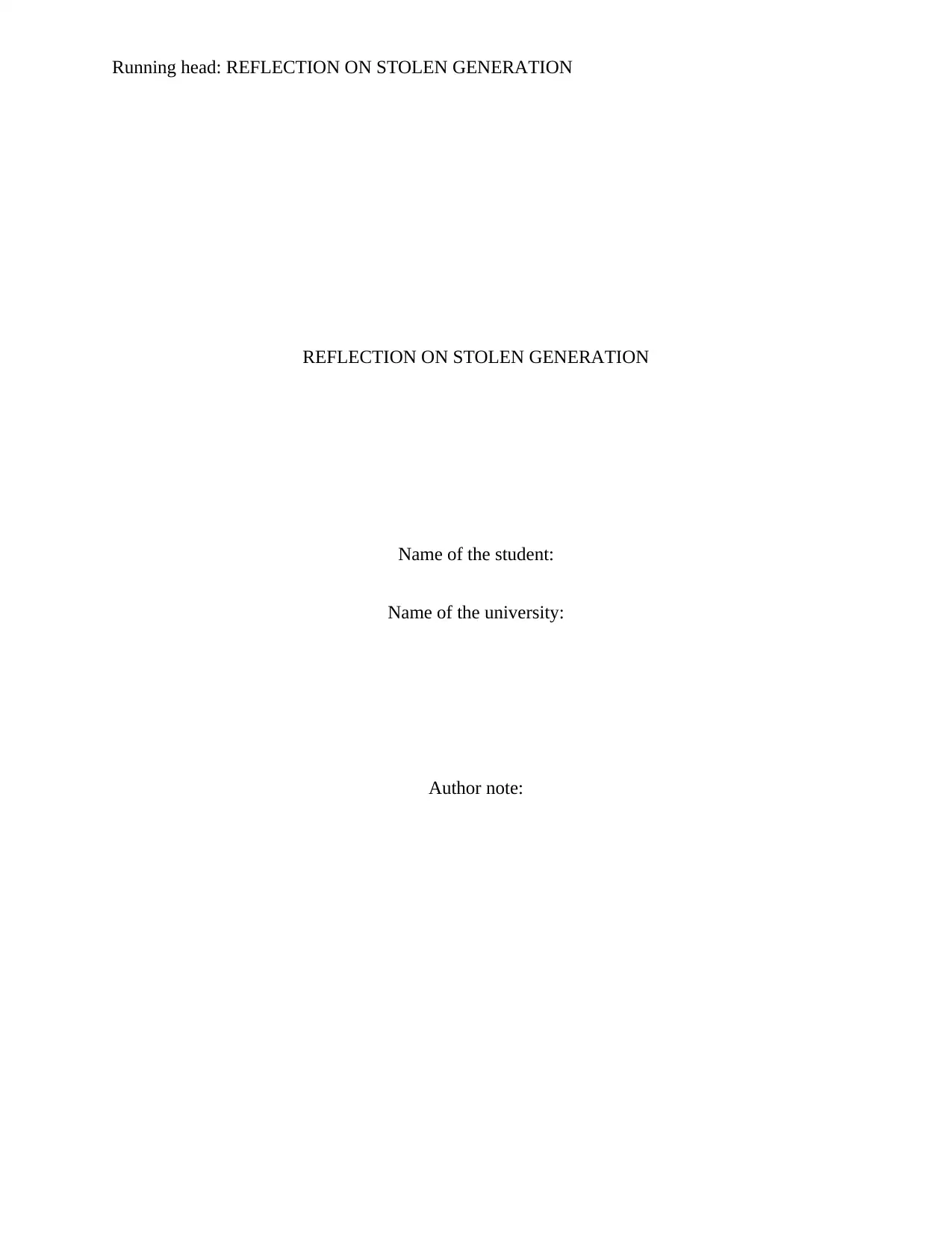
Running head: REFLECTION ON STOLEN GENERATION
REFLECTION ON STOLEN GENERATION
Name of the student:
Name of the university:
Author note:
REFLECTION ON STOLEN GENERATION
Name of the student:
Name of the university:
Author note:
Secure Best Marks with AI Grader
Need help grading? Try our AI Grader for instant feedback on your assignments.
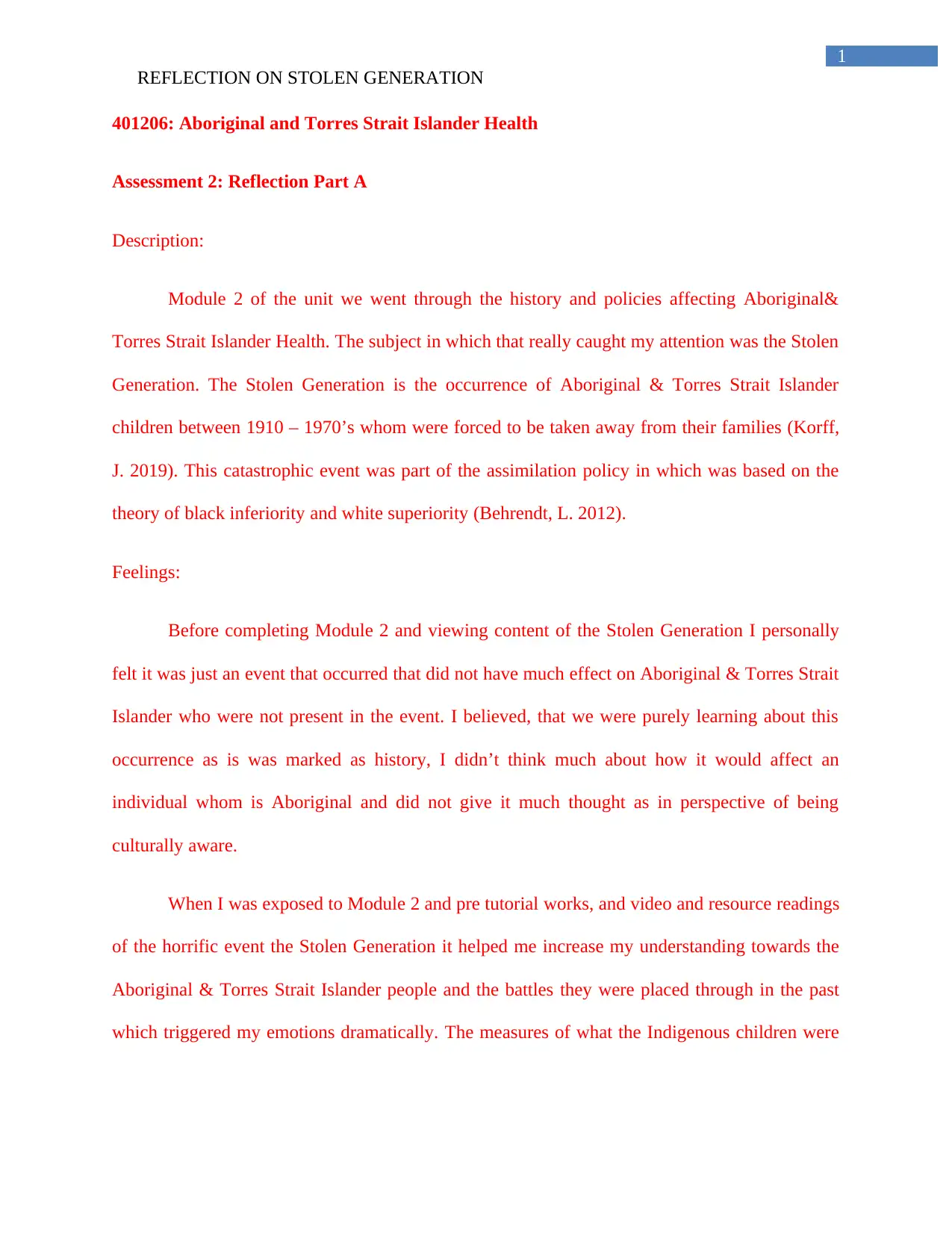
1
REFLECTION ON STOLEN GENERATION
401206: Aboriginal and Torres Strait Islander Health
Assessment 2: Reflection Part A
Description:
Module 2 of the unit we went through the history and policies affecting Aboriginal&
Torres Strait Islander Health. The subject in which that really caught my attention was the Stolen
Generation. The Stolen Generation is the occurrence of Aboriginal & Torres Strait Islander
children between 1910 – 1970’s whom were forced to be taken away from their families (Korff,
J. 2019). This catastrophic event was part of the assimilation policy in which was based on the
theory of black inferiority and white superiority (Behrendt, L. 2012).
Feelings:
Before completing Module 2 and viewing content of the Stolen Generation I personally
felt it was just an event that occurred that did not have much effect on Aboriginal & Torres Strait
Islander who were not present in the event. I believed, that we were purely learning about this
occurrence as is was marked as history, I didn’t think much about how it would affect an
individual whom is Aboriginal and did not give it much thought as in perspective of being
culturally aware.
When I was exposed to Module 2 and pre tutorial works, and video and resource readings
of the horrific event the Stolen Generation it helped me increase my understanding towards the
Aboriginal & Torres Strait Islander people and the battles they were placed through in the past
which triggered my emotions dramatically. The measures of what the Indigenous children were
REFLECTION ON STOLEN GENERATION
401206: Aboriginal and Torres Strait Islander Health
Assessment 2: Reflection Part A
Description:
Module 2 of the unit we went through the history and policies affecting Aboriginal&
Torres Strait Islander Health. The subject in which that really caught my attention was the Stolen
Generation. The Stolen Generation is the occurrence of Aboriginal & Torres Strait Islander
children between 1910 – 1970’s whom were forced to be taken away from their families (Korff,
J. 2019). This catastrophic event was part of the assimilation policy in which was based on the
theory of black inferiority and white superiority (Behrendt, L. 2012).
Feelings:
Before completing Module 2 and viewing content of the Stolen Generation I personally
felt it was just an event that occurred that did not have much effect on Aboriginal & Torres Strait
Islander who were not present in the event. I believed, that we were purely learning about this
occurrence as is was marked as history, I didn’t think much about how it would affect an
individual whom is Aboriginal and did not give it much thought as in perspective of being
culturally aware.
When I was exposed to Module 2 and pre tutorial works, and video and resource readings
of the horrific event the Stolen Generation it helped me increase my understanding towards the
Aboriginal & Torres Strait Islander people and the battles they were placed through in the past
which triggered my emotions dramatically. The measures of what the Indigenous children were
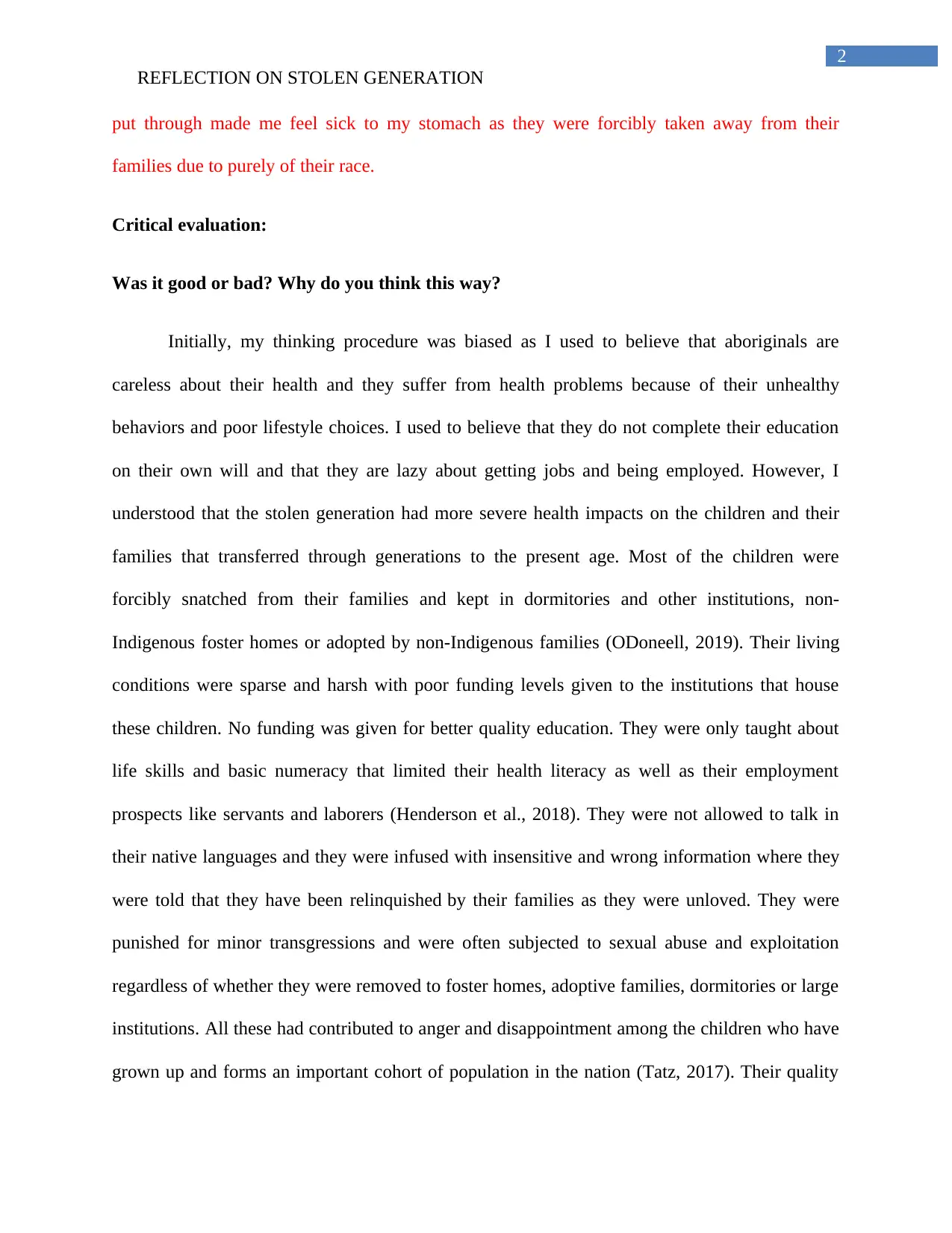
2
REFLECTION ON STOLEN GENERATION
put through made me feel sick to my stomach as they were forcibly taken away from their
families due to purely of their race.
Critical evaluation:
Was it good or bad? Why do you think this way?
Initially, my thinking procedure was biased as I used to believe that aboriginals are
careless about their health and they suffer from health problems because of their unhealthy
behaviors and poor lifestyle choices. I used to believe that they do not complete their education
on their own will and that they are lazy about getting jobs and being employed. However, I
understood that the stolen generation had more severe health impacts on the children and their
families that transferred through generations to the present age. Most of the children were
forcibly snatched from their families and kept in dormitories and other institutions, non-
Indigenous foster homes or adopted by non-Indigenous families (ODoneell, 2019). Their living
conditions were sparse and harsh with poor funding levels given to the institutions that house
these children. No funding was given for better quality education. They were only taught about
life skills and basic numeracy that limited their health literacy as well as their employment
prospects like servants and laborers (Henderson et al., 2018). They were not allowed to talk in
their native languages and they were infused with insensitive and wrong information where they
were told that they have been relinquished by their families as they were unloved. They were
punished for minor transgressions and were often subjected to sexual abuse and exploitation
regardless of whether they were removed to foster homes, adoptive families, dormitories or large
institutions. All these had contributed to anger and disappointment among the children who have
grown up and forms an important cohort of population in the nation (Tatz, 2017). Their quality
REFLECTION ON STOLEN GENERATION
put through made me feel sick to my stomach as they were forcibly taken away from their
families due to purely of their race.
Critical evaluation:
Was it good or bad? Why do you think this way?
Initially, my thinking procedure was biased as I used to believe that aboriginals are
careless about their health and they suffer from health problems because of their unhealthy
behaviors and poor lifestyle choices. I used to believe that they do not complete their education
on their own will and that they are lazy about getting jobs and being employed. However, I
understood that the stolen generation had more severe health impacts on the children and their
families that transferred through generations to the present age. Most of the children were
forcibly snatched from their families and kept in dormitories and other institutions, non-
Indigenous foster homes or adopted by non-Indigenous families (ODoneell, 2019). Their living
conditions were sparse and harsh with poor funding levels given to the institutions that house
these children. No funding was given for better quality education. They were only taught about
life skills and basic numeracy that limited their health literacy as well as their employment
prospects like servants and laborers (Henderson et al., 2018). They were not allowed to talk in
their native languages and they were infused with insensitive and wrong information where they
were told that they have been relinquished by their families as they were unloved. They were
punished for minor transgressions and were often subjected to sexual abuse and exploitation
regardless of whether they were removed to foster homes, adoptive families, dormitories or large
institutions. All these had contributed to anger and disappointment among the children who have
grown up and forms an important cohort of population in the nation (Tatz, 2017). Their quality
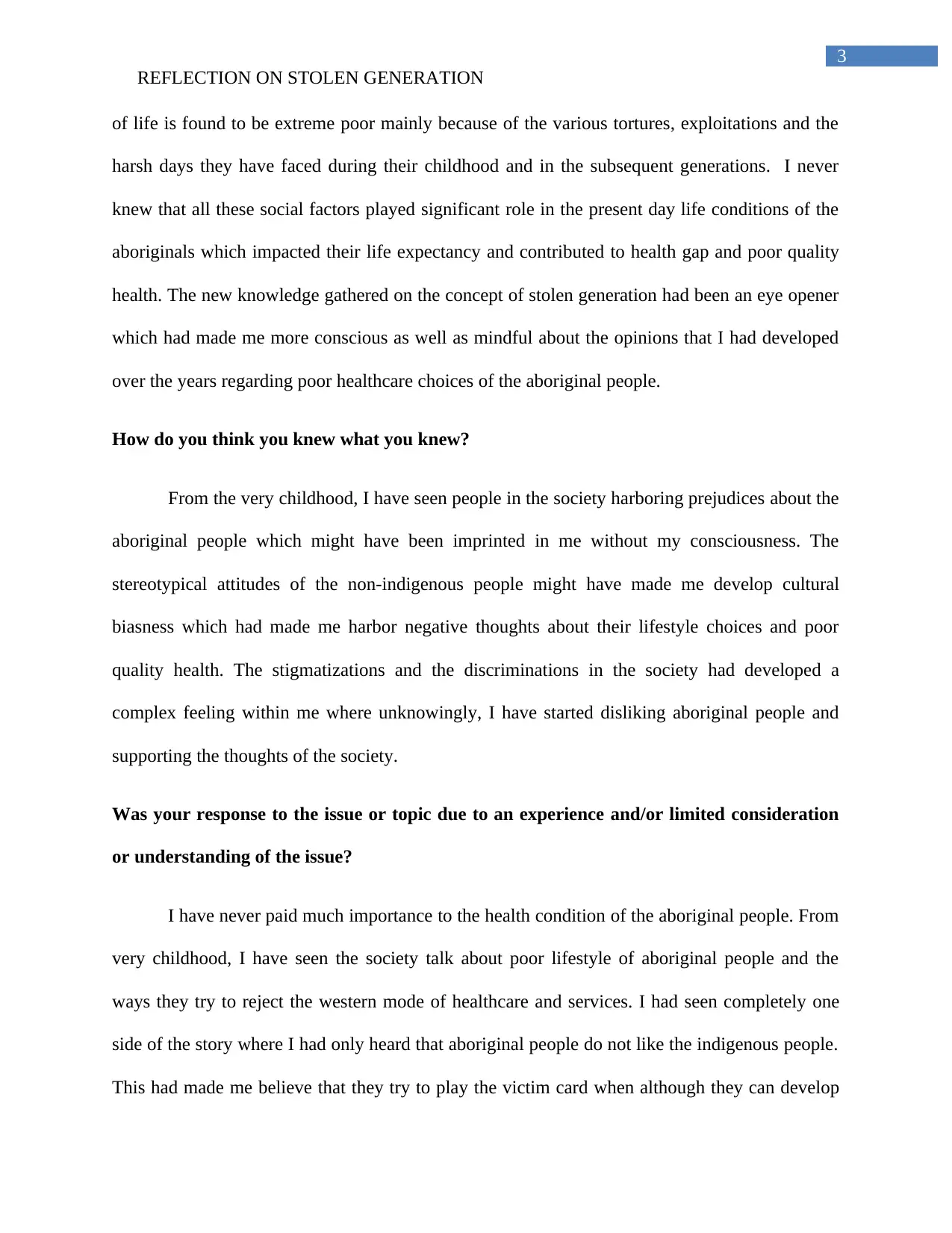
3
REFLECTION ON STOLEN GENERATION
of life is found to be extreme poor mainly because of the various tortures, exploitations and the
harsh days they have faced during their childhood and in the subsequent generations. I never
knew that all these social factors played significant role in the present day life conditions of the
aboriginals which impacted their life expectancy and contributed to health gap and poor quality
health. The new knowledge gathered on the concept of stolen generation had been an eye opener
which had made me more conscious as well as mindful about the opinions that I had developed
over the years regarding poor healthcare choices of the aboriginal people.
How do you think you knew what you knew?
From the very childhood, I have seen people in the society harboring prejudices about the
aboriginal people which might have been imprinted in me without my consciousness. The
stereotypical attitudes of the non-indigenous people might have made me develop cultural
biasness which had made me harbor negative thoughts about their lifestyle choices and poor
quality health. The stigmatizations and the discriminations in the society had developed a
complex feeling within me where unknowingly, I have started disliking aboriginal people and
supporting the thoughts of the society.
Was your response to the issue or topic due to an experience and/or limited consideration
or understanding of the issue?
I have never paid much importance to the health condition of the aboriginal people. From
very childhood, I have seen the society talk about poor lifestyle of aboriginal people and the
ways they try to reject the western mode of healthcare and services. I had seen completely one
side of the story where I had only heard that aboriginal people do not like the indigenous people.
This had made me believe that they try to play the victim card when although they can develop
REFLECTION ON STOLEN GENERATION
of life is found to be extreme poor mainly because of the various tortures, exploitations and the
harsh days they have faced during their childhood and in the subsequent generations. I never
knew that all these social factors played significant role in the present day life conditions of the
aboriginals which impacted their life expectancy and contributed to health gap and poor quality
health. The new knowledge gathered on the concept of stolen generation had been an eye opener
which had made me more conscious as well as mindful about the opinions that I had developed
over the years regarding poor healthcare choices of the aboriginal people.
How do you think you knew what you knew?
From the very childhood, I have seen people in the society harboring prejudices about the
aboriginal people which might have been imprinted in me without my consciousness. The
stereotypical attitudes of the non-indigenous people might have made me develop cultural
biasness which had made me harbor negative thoughts about their lifestyle choices and poor
quality health. The stigmatizations and the discriminations in the society had developed a
complex feeling within me where unknowingly, I have started disliking aboriginal people and
supporting the thoughts of the society.
Was your response to the issue or topic due to an experience and/or limited consideration
or understanding of the issue?
I have never paid much importance to the health condition of the aboriginal people. From
very childhood, I have seen the society talk about poor lifestyle of aboriginal people and the
ways they try to reject the western mode of healthcare and services. I had seen completely one
side of the story where I had only heard that aboriginal people do not like the indigenous people.
This had made me believe that they try to play the victim card when although they can develop
Secure Best Marks with AI Grader
Need help grading? Try our AI Grader for instant feedback on your assignments.
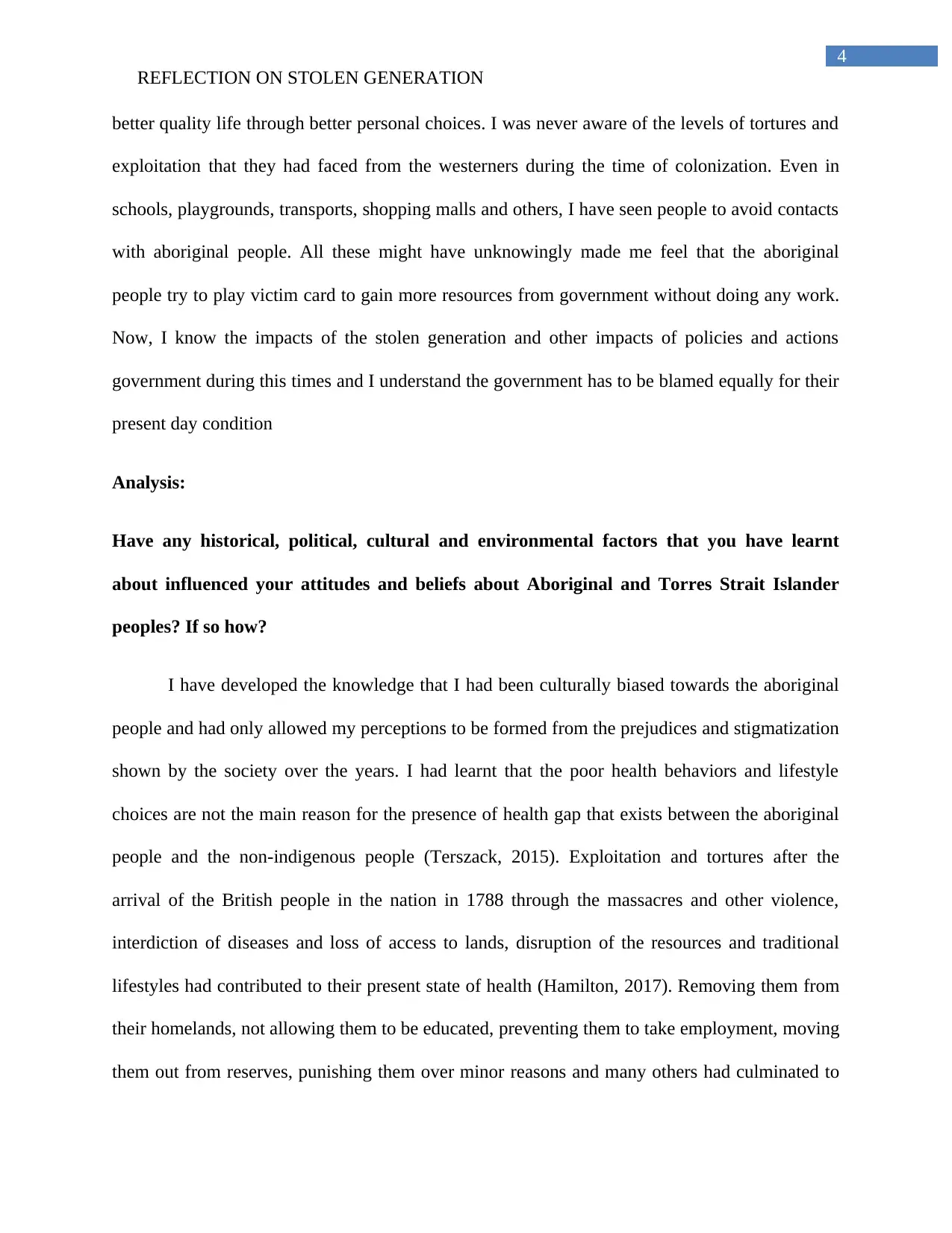
4
REFLECTION ON STOLEN GENERATION
better quality life through better personal choices. I was never aware of the levels of tortures and
exploitation that they had faced from the westerners during the time of colonization. Even in
schools, playgrounds, transports, shopping malls and others, I have seen people to avoid contacts
with aboriginal people. All these might have unknowingly made me feel that the aboriginal
people try to play victim card to gain more resources from government without doing any work.
Now, I know the impacts of the stolen generation and other impacts of policies and actions
government during this times and I understand the government has to be blamed equally for their
present day condition
Analysis:
Have any historical, political, cultural and environmental factors that you have learnt
about influenced your attitudes and beliefs about Aboriginal and Torres Strait Islander
peoples? If so how?
I have developed the knowledge that I had been culturally biased towards the aboriginal
people and had only allowed my perceptions to be formed from the prejudices and stigmatization
shown by the society over the years. I had learnt that the poor health behaviors and lifestyle
choices are not the main reason for the presence of health gap that exists between the aboriginal
people and the non-indigenous people (Terszack, 2015). Exploitation and tortures after the
arrival of the British people in the nation in 1788 through the massacres and other violence,
interdiction of diseases and loss of access to lands, disruption of the resources and traditional
lifestyles had contributed to their present state of health (Hamilton, 2017). Removing them from
their homelands, not allowing them to be educated, preventing them to take employment, moving
them out from reserves, punishing them over minor reasons and many others had culminated to
REFLECTION ON STOLEN GENERATION
better quality life through better personal choices. I was never aware of the levels of tortures and
exploitation that they had faced from the westerners during the time of colonization. Even in
schools, playgrounds, transports, shopping malls and others, I have seen people to avoid contacts
with aboriginal people. All these might have unknowingly made me feel that the aboriginal
people try to play victim card to gain more resources from government without doing any work.
Now, I know the impacts of the stolen generation and other impacts of policies and actions
government during this times and I understand the government has to be blamed equally for their
present day condition
Analysis:
Have any historical, political, cultural and environmental factors that you have learnt
about influenced your attitudes and beliefs about Aboriginal and Torres Strait Islander
peoples? If so how?
I have developed the knowledge that I had been culturally biased towards the aboriginal
people and had only allowed my perceptions to be formed from the prejudices and stigmatization
shown by the society over the years. I had learnt that the poor health behaviors and lifestyle
choices are not the main reason for the presence of health gap that exists between the aboriginal
people and the non-indigenous people (Terszack, 2015). Exploitation and tortures after the
arrival of the British people in the nation in 1788 through the massacres and other violence,
interdiction of diseases and loss of access to lands, disruption of the resources and traditional
lifestyles had contributed to their present state of health (Hamilton, 2017). Removing them from
their homelands, not allowing them to be educated, preventing them to take employment, moving
them out from reserves, punishing them over minor reasons and many others had culminated to
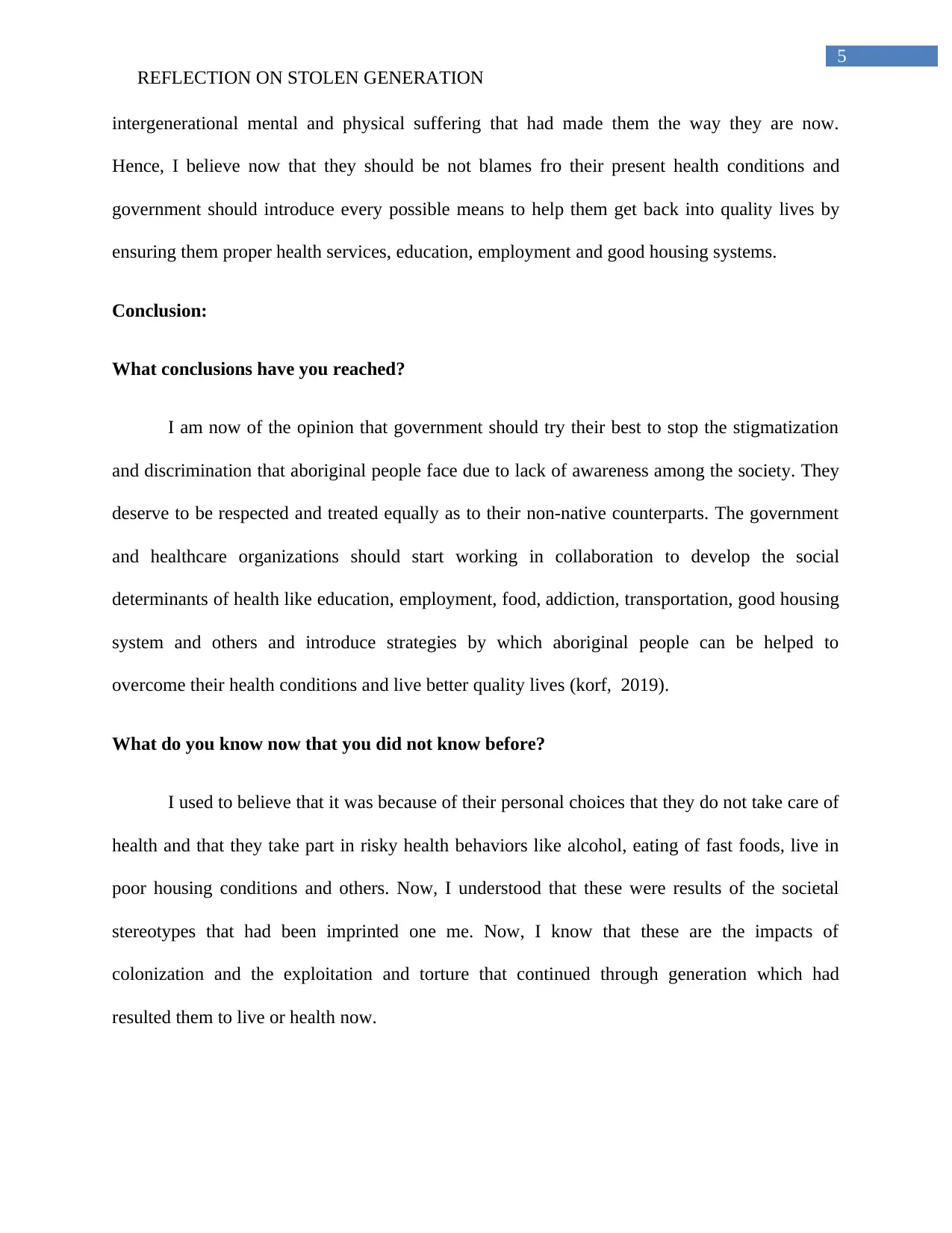
5
REFLECTION ON STOLEN GENERATION
intergenerational mental and physical suffering that had made them the way they are now.
Hence, I believe now that they should be not blames fro their present health conditions and
government should introduce every possible means to help them get back into quality lives by
ensuring them proper health services, education, employment and good housing systems.
Conclusion:
What conclusions have you reached?
I am now of the opinion that government should try their best to stop the stigmatization
and discrimination that aboriginal people face due to lack of awareness among the society. They
deserve to be respected and treated equally as to their non-native counterparts. The government
and healthcare organizations should start working in collaboration to develop the social
determinants of health like education, employment, food, addiction, transportation, good housing
system and others and introduce strategies by which aboriginal people can be helped to
overcome their health conditions and live better quality lives (korf, 2019).
What do you know now that you did not know before?
I used to believe that it was because of their personal choices that they do not take care of
health and that they take part in risky health behaviors like alcohol, eating of fast foods, live in
poor housing conditions and others. Now, I understood that these were results of the societal
stereotypes that had been imprinted one me. Now, I know that these are the impacts of
colonization and the exploitation and torture that continued through generation which had
resulted them to live or health now.
REFLECTION ON STOLEN GENERATION
intergenerational mental and physical suffering that had made them the way they are now.
Hence, I believe now that they should be not blames fro their present health conditions and
government should introduce every possible means to help them get back into quality lives by
ensuring them proper health services, education, employment and good housing systems.
Conclusion:
What conclusions have you reached?
I am now of the opinion that government should try their best to stop the stigmatization
and discrimination that aboriginal people face due to lack of awareness among the society. They
deserve to be respected and treated equally as to their non-native counterparts. The government
and healthcare organizations should start working in collaboration to develop the social
determinants of health like education, employment, food, addiction, transportation, good housing
system and others and introduce strategies by which aboriginal people can be helped to
overcome their health conditions and live better quality lives (korf, 2019).
What do you know now that you did not know before?
I used to believe that it was because of their personal choices that they do not take care of
health and that they take part in risky health behaviors like alcohol, eating of fast foods, live in
poor housing conditions and others. Now, I understood that these were results of the societal
stereotypes that had been imprinted one me. Now, I know that these are the impacts of
colonization and the exploitation and torture that continued through generation which had
resulted them to live or health now.
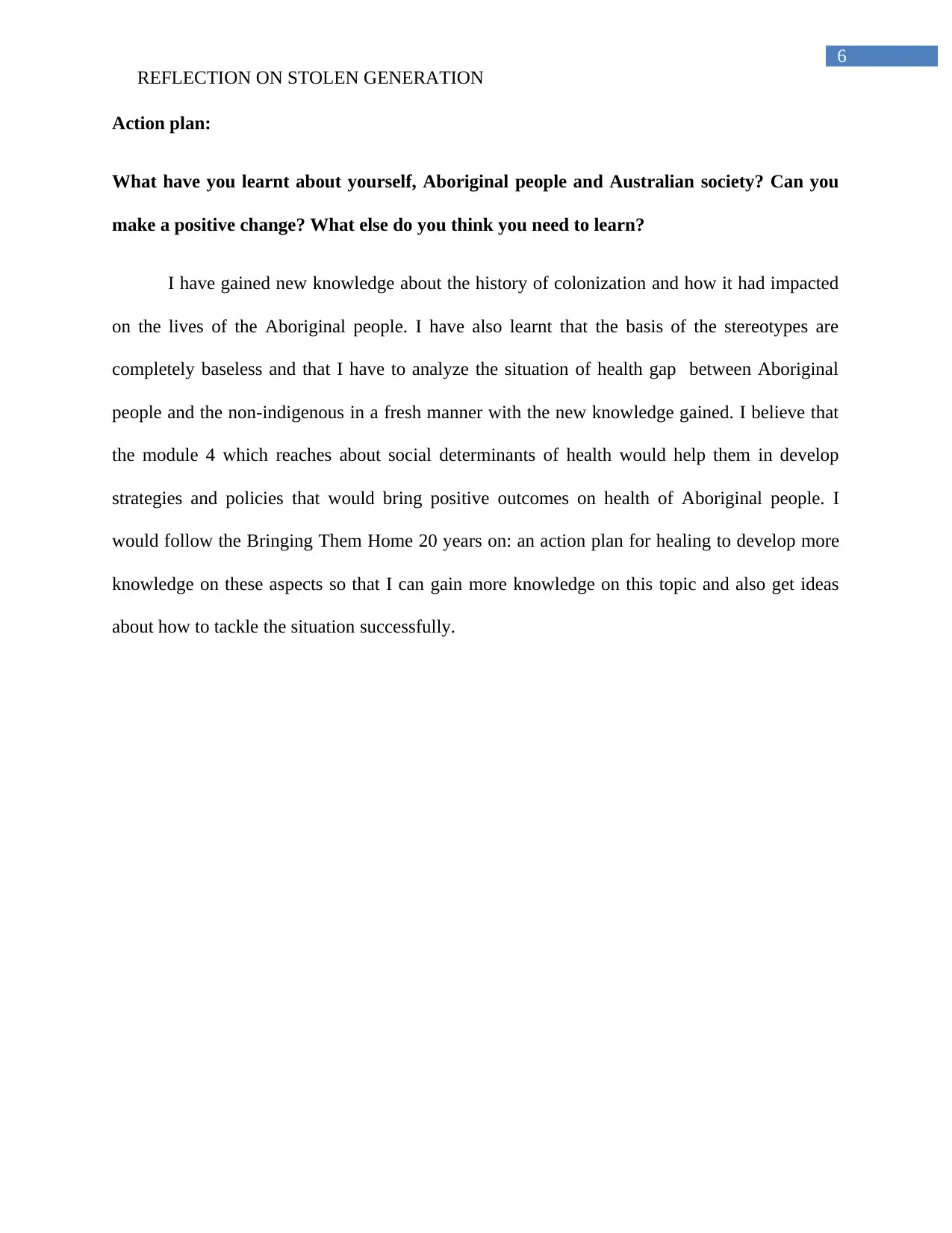
6
REFLECTION ON STOLEN GENERATION
Action plan:
What have you learnt about yourself, Aboriginal people and Australian society? Can you
make a positive change? What else do you think you need to learn?
I have gained new knowledge about the history of colonization and how it had impacted
on the lives of the Aboriginal people. I have also learnt that the basis of the stereotypes are
completely baseless and that I have to analyze the situation of health gap between Aboriginal
people and the non-indigenous in a fresh manner with the new knowledge gained. I believe that
the module 4 which reaches about social determinants of health would help them in develop
strategies and policies that would bring positive outcomes on health of Aboriginal people. I
would follow the Bringing Them Home 20 years on: an action plan for healing to develop more
knowledge on these aspects so that I can gain more knowledge on this topic and also get ideas
about how to tackle the situation successfully.
REFLECTION ON STOLEN GENERATION
Action plan:
What have you learnt about yourself, Aboriginal people and Australian society? Can you
make a positive change? What else do you think you need to learn?
I have gained new knowledge about the history of colonization and how it had impacted
on the lives of the Aboriginal people. I have also learnt that the basis of the stereotypes are
completely baseless and that I have to analyze the situation of health gap between Aboriginal
people and the non-indigenous in a fresh manner with the new knowledge gained. I believe that
the module 4 which reaches about social determinants of health would help them in develop
strategies and policies that would bring positive outcomes on health of Aboriginal people. I
would follow the Bringing Them Home 20 years on: an action plan for healing to develop more
knowledge on these aspects so that I can gain more knowledge on this topic and also get ideas
about how to tackle the situation successfully.
Paraphrase This Document
Need a fresh take? Get an instant paraphrase of this document with our AI Paraphraser
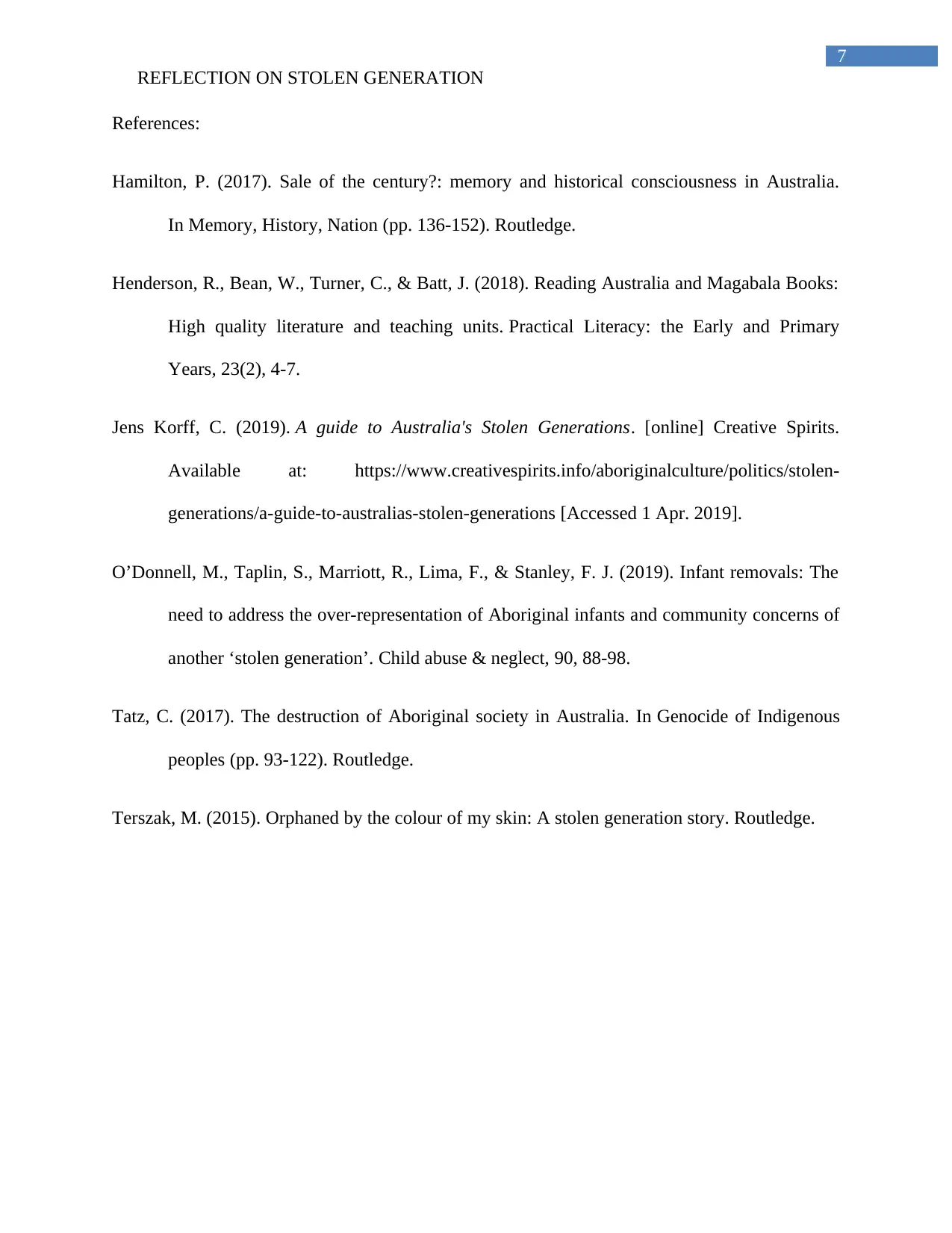
7
REFLECTION ON STOLEN GENERATION
References:
Hamilton, P. (2017). Sale of the century?: memory and historical consciousness in Australia.
In Memory, History, Nation (pp. 136-152). Routledge.
Henderson, R., Bean, W., Turner, C., & Batt, J. (2018). Reading Australia and Magabala Books:
High quality literature and teaching units. Practical Literacy: the Early and Primary
Years, 23(2), 4-7.
Jens Korff, C. (2019). A guide to Australia's Stolen Generations. [online] Creative Spirits.
Available at: https://www.creativespirits.info/aboriginalculture/politics/stolen-
generations/a-guide-to-australias-stolen-generations [Accessed 1 Apr. 2019].
O’Donnell, M., Taplin, S., Marriott, R., Lima, F., & Stanley, F. J. (2019). Infant removals: The
need to address the over-representation of Aboriginal infants and community concerns of
another ‘stolen generation’. Child abuse & neglect, 90, 88-98.
Tatz, C. (2017). The destruction of Aboriginal society in Australia. In Genocide of Indigenous
peoples (pp. 93-122). Routledge.
Terszak, M. (2015). Orphaned by the colour of my skin: A stolen generation story. Routledge.
REFLECTION ON STOLEN GENERATION
References:
Hamilton, P. (2017). Sale of the century?: memory and historical consciousness in Australia.
In Memory, History, Nation (pp. 136-152). Routledge.
Henderson, R., Bean, W., Turner, C., & Batt, J. (2018). Reading Australia and Magabala Books:
High quality literature and teaching units. Practical Literacy: the Early and Primary
Years, 23(2), 4-7.
Jens Korff, C. (2019). A guide to Australia's Stolen Generations. [online] Creative Spirits.
Available at: https://www.creativespirits.info/aboriginalculture/politics/stolen-
generations/a-guide-to-australias-stolen-generations [Accessed 1 Apr. 2019].
O’Donnell, M., Taplin, S., Marriott, R., Lima, F., & Stanley, F. J. (2019). Infant removals: The
need to address the over-representation of Aboriginal infants and community concerns of
another ‘stolen generation’. Child abuse & neglect, 90, 88-98.
Tatz, C. (2017). The destruction of Aboriginal society in Australia. In Genocide of Indigenous
peoples (pp. 93-122). Routledge.
Terszak, M. (2015). Orphaned by the colour of my skin: A stolen generation story. Routledge.
1 out of 8
Related Documents
Your All-in-One AI-Powered Toolkit for Academic Success.
+13062052269
info@desklib.com
Available 24*7 on WhatsApp / Email
![[object Object]](/_next/static/media/star-bottom.7253800d.svg)
Unlock your academic potential
© 2024 | Zucol Services PVT LTD | All rights reserved.





